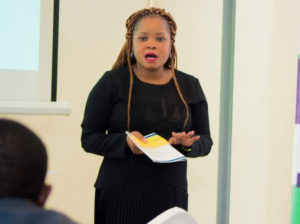Zaituni Njovu’s friend seemed to have everything to live for.
Smart, affluent and well-educated, she worked with Njovu at a bank in Dar es Salaam, Tanzania. But then an old boyfriend set out to ruin her reputation. He cobbled together suggestive photos of her into a video and posted it online. As the photos spread, so did the leering emails, the texts, the comments. Tragically, the harassment ultimately drove Njovu’s friend to end her own life.
If she were the only one, that would be tragic enough. But in Tanzania, in Africa, and around the world, the same tragedy plays out again and again. Women are twice as likely as men to be victims of online harassment, according to Amnesty International. And as women’s political participation surges, the epidemic of trolling, phishing, viruses, cyber-stalking, threats and scams puts in danger not only professional women like Njovu’s friend, but women politicians, activists, journalists and leaders. The pattern of online harassment is directly threatening women’s freedom of speech, expression, and political rights—particularly in places where women’s voices are most needed.
To learn more about Zaituni and her journey, click here.

